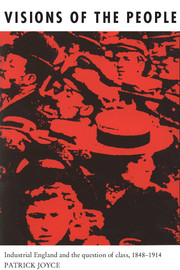Book contents
- Frontmatter
- Contents
- List of plates
- Acknowledgements
- 1 Introduction: beyond class?
- PART I POWER AND THE PEOPLE: POLITICS AND THE SOCIAL ORDER
- PART II MORALISING THE MARKET: WORK AND THE SOCIAL ORDER
- PART III CUSTOM, HISTORY, LANGUAGE: POPULAR CULTURE AND THE SOCIAL ORDER
- PART IV KINGDOMS OF THE MIND: THE IMAGINARY CONSTITUTION OF THE SOCIAL ORDER
- Appendices
- Bibliographical note
- Notes
- Index
1 - Introduction: beyond class?
Published online by Cambridge University Press: 05 March 2012
- Frontmatter
- Contents
- List of plates
- Acknowledgements
- 1 Introduction: beyond class?
- PART I POWER AND THE PEOPLE: POLITICS AND THE SOCIAL ORDER
- PART II MORALISING THE MARKET: WORK AND THE SOCIAL ORDER
- PART III CUSTOM, HISTORY, LANGUAGE: POPULAR CULTURE AND THE SOCIAL ORDER
- PART IV KINGDOMS OF THE MIND: THE IMAGINARY CONSTITUTION OF THE SOCIAL ORDER
- Appendices
- Bibliographical note
- Notes
- Index
Summary
Until relatively recently, ‘class’ in British history was a settled matter. The periodisation given to the ‘class consciousness’ of workers had assumed fairly distinct lines. Despite the large amount of subsequent scholarship, the work of E. P. Thompson and E. J. Hobsbawm remained, and remains, central, fixing the historical sequence of class development. Thompson's enormously influential The Making of the English Working Class presents a picture of class consciousness as substantially ‘made’ by around 1830, the outcome of the effect of early industrialisation and political change upon the plebeity or common people of late eighteenth-century England. Hobsbawm looks to the consolidation of industrial capitalism in the late nineteenth century, rather than to its inception. Whatever the differences, class is seen as probably the major cultural and political expression of the prolonged sequence of nineteenth-century industrial change, if not determined by such change then developing roughly in step with it.
This has now taken the form of received wisdom. However, while there is no denying that class was a child of the nineteenth century, when it comes to how the social order was represented and understood, there were other children too who were every bit as lusty as class – indeed, in many respects stronger and more fully part of their time. Received wisdom has in fact become a dead weight, the fixation with class denying us sight of these other visions of the social order.
- Type
- Chapter
- Information
- Visions of the PeopleIndustrial England and the Question of Class, c.1848–1914, pp. 1 - 24Publisher: Cambridge University PressPrint publication year: 1991
- 1
- Cited by



